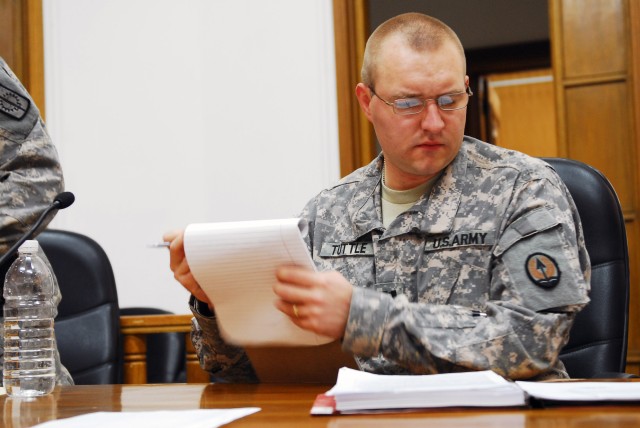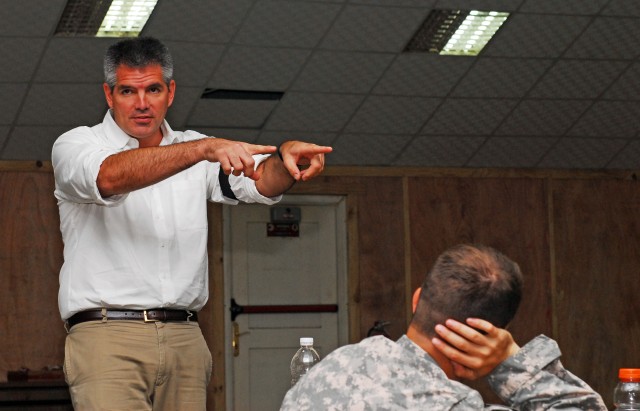The Trial Counsel Assistance Program recently held a four-day course at Camp Victory to help 41 trial counsels and paralegals from throughout Iraq better prosecute sexual assault cases.
"Training on how to effectively prosecute sexual assault crimes will send a signal to would be abusers that we have the necessary skills to put them away, and hopefully will comfort the victims to know we will do everything in our power to serve justice," Capt. Nathan J. Bankson, Multi-National Corps- Iraq chief of justice, said.
As the chief of justice, Bankson has oversight of all the trial counsels in theater. It was at his request that TCAP conducted their first trip to a theater of operations to assist the prosecutors.
The course began with an overview of victim dynamics and the behaviors of sexual predators.
"People in general have intuitive responses the way they think victims should act, they believe they are going to shout no, fight back and immediately report the assault, " Capt. Sasha N. Rutizer, TCAP training officer, explained.
Roger Canaff, one of three civilian highly qualified experts hired by the government, said sexual assault does not typically occur between strangers. The victim does not often report the rape themselves, if at all.
Canaff, a sex crimes and child abuse prosecutor from the Bronx, said it is also not uncommon for a victim to continue contact with the assailant.
"Just because a victim continued to communicate, either by text message or emails, with the perpetrator does not mean they were not raped," Canaff said.
An assailant will go after what Canaff called soft targets, victims that have an alcohol problem, are perceived as promiscuous by others, or suffer from mental health issues.
"A perpetrator is not easy to spot, they are not creepy looking, they are not large, intimidating stalkers," Canaff said. "Undetected rapist appear to be decent Soldiers, they use alcohol and manipulation to obtain sex, not by chasing women down dark alleys and incapacitating them physically."
Understanding how to break through these myths to a court-martial panel are key to prosecuting alleged assailants.
"We are identifying what is a target of opportunity for a predator and to understand what's going on his mind so we can tell the story of the victim and better prove the facts of the case," Bankson added.
"In the last five to 10 years, there has been a lot of success in educating civilian attorneys, judges and juries," Canaff said. "We are trying to obtain that same success here."
The one of the reasons Canaff agreed to make the trip to Iraq was to learn what the extent of the problem is and what challenges are being imposed by being in theater.
In his experience there have been more alcohol related sexual assaults stateside because it is more readily available and there is more socializing. Canaff said in theater there is less leisure time and far less access to alcohol, which is how predators thrive.
As a result, there are more low-level groping offenses, wrongful sexual contact and rape by force in Iraq when compared to a garrison environment.
Rarely do the attorneys have the opportunity to gather together in such a forum while deployed, so on the fourth and final day they spent the afternoon reviewing current cases peer to peer.
"Today's session we are talking about pending cases to discuss among ourselves approaches, charging and how to use evidence to gain a conviction," Capt. Jeremy Scholtes, 17th Fires Brigade trial counsel, Multi-National Division-North, said.
Scholtes spent three days traveling so he could attend the course.
"Article 120 of the Uniform Code of Military Justice assimilates federal law," he said after the course, "that is why the highly qualified expert is so useful, he shows us the way they have been trying these cases in civilian court for years."
Capt. John Tuttle, Task Force Courage and Task Force Troy trial counsel said TCAP was a valuable tool for the young attorneys in theater.
"When you first get thrown in here, your first case may be a rape or murder." Tuttle said. "With TCAP you have more resources to make your case, they can provide you with an understanding of the science and the psychology behind it."




Social Sharing